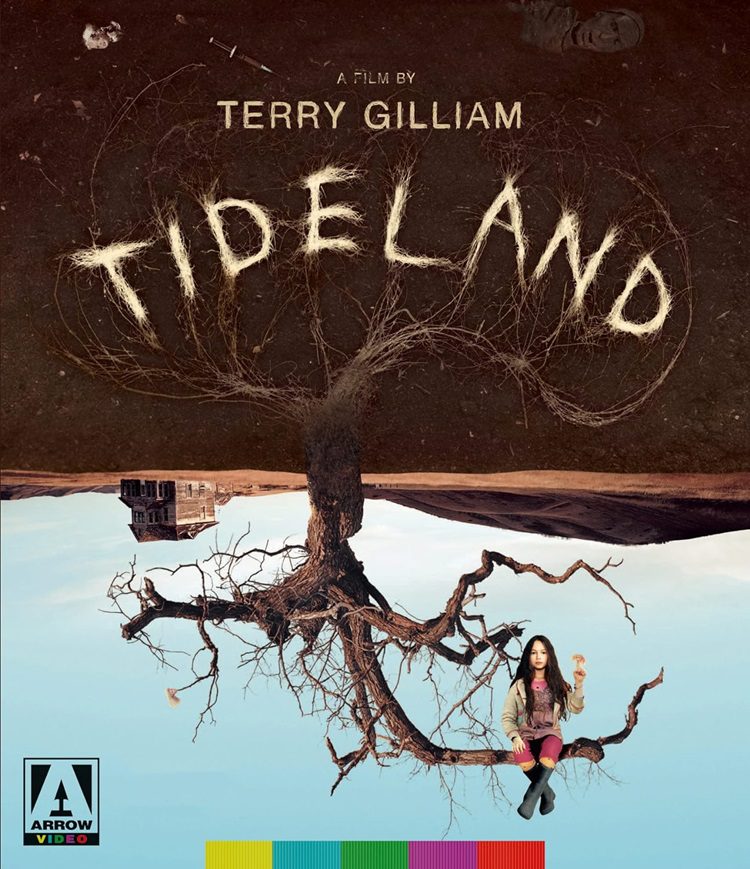
In a recorded introduction to Tideland, director Terry Gilliam states flat out, “Many of you are not going to like this film.” And “Don’t forget to laugh.” I didn’t find a whole lot to laugh about in Tideland, which earned Gilliam the worst reviews of his career and scared up very little in the way of box-office returns. Gilliam has never been a commercial filmmaker, though. A challenging vision coming from him isn’t a surprise. And Tideland is not some routine carnival of shock and gore. It is more thoughtful in its repulsive elements, and more likely to get under your skin.
At the center of the film is Jeliza-Rose, played by then 10-year-old actress Jodelle Ferland. Her parents (Jeff Bridges and Jennifer Tilly) are drug addicts, and Rose dutifully prepared her father’s heroin for him, so he can go on his nightly “vacation”. Rose loves Dad, and doesn’t much see the use of Mom, so when Mom dies from a toxic reaction to Methadone, Rose is happy to go off on an adventure to grandma’s. Sure, grandma had been dead for years, but her house might still be standing. When Dad himself croaks from a heroin overdose, Rose’s relationship with him doesn’t change too much, since she’s used to interacting with inanimate objects. Her only friends are a quartet of severed doll heads she puts on her fingers and who talk to her, so she never feels alone.
At grandma’s house, she eventually meets her neighbors – the sinister Deel, whom Rose identifies as a ghost, a pirate, and a witch at alternate times, and Deel’s brother Dickens, who’s got a long scar running down his head from brain surgery to cure his epilepsy. Deel threatens and pushes the little girl around, while Dickens is on about the same mental level as Rose, though he’s twice her age. His affection to the girl grows more disturbing and less innocent the more they play house with each other.
It’s a story with a lot of melodramatic elements – mentally challenged neighbor love interests, dying parents, insane women, houses that look like a stiff breeze could blow them over. Combine that with Terry Gilliam’s willingness to allow his actors to not so much go over the top as to leap from top to top in single bounds like Superman in the ’30s, and just from a volume level Tideland is a lot to take in. Rose speaks with a thick southern accent, Deel spits out her lines like she’s playing the Wicked Witch of the West on stage, and Dickens gives a committed performance, but his extremely shouty and slurred voice is grating. The point of the film may be to see things from the perspective of a child who does not know how depraved and strange life is around her (it is, after all, the only life she knows) but Tideland is still completely exhausting to watch.
Another common element in Terry Gilliam’s films is the routine intrusion of fantasy into reality. With the reality of Tideland so grotesque, it is a relief when Gilliam indulges himself, and it results in some of the most beautiful and resonant images in the film. On the bus ride to grandma’s house, the bus passes under a bridge at night, in the city, and emerges in daytime in the country in one beautiful, still shot. After pretending with Dickens that a tree fort full of scraps was a submarine, Rose imagines her entire world underwater, and the sequence has the light-hearted handmade quality that make Gilliam’s effects standout.
But there’s so much dankness, darkness, and ugliness in Rose’s real world that it begins to wear down the audience’s nerves, and patience. I can understand and appreciate Gilliam’s point – that children are not wracked with adult anxieties, or hang-ups, and so can approach the world with open hearts and minds. But one of the reasons adults have these anxieties and these hang-ups, if they’re not completely neurotic, is because they know more and can appreciate very real dangers that can befall one in the world.
Terry Gilliam’s films often have the feeling of a kid getting away with something. Often they’re rough around the edges, with a sense of naughtiness without moving full bore into offensiveness. With Tideland, the balance between heart-lifting visuals and heart-rending reality may have shifted too much to the former. It’s a difficult film to sit through – not just because of the ugliness, but from the pitch of the performances, which chew the scenery rabidly. And with Terry Gilliam’s wildly detailed production design, there’s a lot of scenery to chew. I find the film compelling but at the same time more than a little revolting. I do not hate it, but believe some other viewers would be fully justified if they did.
Tideland has been released on Blu-ray by Arrow Video. To my knowledge, this is the first time the movie has been released in the United States in its proper theatrical aspect ratio of 2:35:1, the earlier DVD release being 1.78:1. Besides the essay in the booklet by Neil Mitchell, all of the extras on this Blu-ray were previously available on DVD. However, since Terry Gilliam is one of the filmmakers most open to having his process observed (indeed, the making-of documentary opens with him pissing into a stream), the extras were already copious. They include a commentary track with Gilliam and his writer Tony Grisoni, a 45-minute documentary on the making of Tideland, and a short EPK-style making of featurette. There’s also a set of deleted scenes; a short featurette on green-screen work; interviews with Terry Gilliam, producer Jerry Thomas, actors Jeff Bridges, Jodelle Ferland, and Jennifer Tilly; 20 minutes of B-roll footage; a photo gallery; and a trailer.